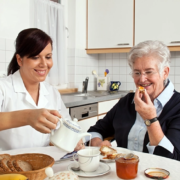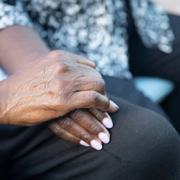As a neurological disease, Parkinson’s disease (PD) affects movement, balance, and muscle control. Parkinson’s is progressive with symptoms becoming more advanced over time. Parkinson’s is diagnosed more frequent in men than in women and is more typically diagnosed in 55 to 75 year olds. Due to this, Parkinson’s patients need added attention due to high fall risk.
With Parkinson’s patients, falls are a major concern. It is beneficial to install home devices that can prevent falls and help stability. Examples of home improvements include:
- Purchase electric bed or mattress. Sliding boards are beneficial for improving the patient’s ability to slide out of bed.
- Install rails for added support in hallways, bedroom and bathrooms.
- Remove floor mats and floor clutter so the walking path is clear and debris free.
- Utilize chairs with arm rests, straight backs, and firm seats.
It is more common that the disease is diagnosed through symptoms, more obviously observed when starting initial movement. Signs of Parkinson’s include slowness of motion, muscle rigidity, tremors in the arms, hands, face, and legs. As PD advances, patients may suffer from depression, memory issues and thought process loss, speech problems, along with difficulty eating, swallowing, and digestive issues.
Since Parkinson disease has no cure, treatment is focused on improving the quality of life, and minimizing symptoms. Exercise is beneficial and can impact rehabilitation positively. Utilizing physical therapy is important and usually involves both passive and active exercise, gait training, and practice to improve daily functioning.
Mental training is also beneficial to improve the quality of life for a PD patient. Encourage the PD patient to learn new hobbies to improve finger and hand mobility. New hobbies can include: playing cards, sewing, fishing, to carpentry. Practice deep breathing and relaxation exercise to help reduce anxiety, improve speech, and control tremors. Both the patient and family should consider therapy and support for loss of motivation and depression. Support programs can be beneficial for the patient and family. Also, speech therapy may be helpful for those who develop a monotone voice or suffer from a loss of volume. Therapy is needed to improve speech and to evaluate and monitor swallowing.
With early and mid-stage Parkinson’s, passive exercise is utilized to prevent muscles from shortening. To help improve mobility, exercise starts out with gentle and slow movement to overtime increase more intensely. Active exercises are used to help range-of-motion, speed, and improve coordination and balance. Patients need continual exercise and should make efforts to practice movement. Helpful exercise includes making circular arm movements, marching in place, and raising the legs up and down while sitting.
Gait Training Practice exercises for turning, walking, and standing to improve balance. Use the following tips:
- Use small steps while turning.
- When walking, take large steps, raising the toes at the forward step, and hit the ground with your heel.
- Use a metronome or devices that keep a rhythmic beat. This may help to take longer steps and walk faster.
- Do not wear rubber shoes because they grip the floor and may cause you to trip and fall.
- When turning or walking, spread the legs 12 – 15 inches apart to provide a wider base of support.
Muscle Freezing Reduction The patient should daily practice strategies to reduce muscle freezing. Freezing occurs when a patient initiates movement or encounters a road block. The following tips may be useful:
- Raise the toes if the legs seem frozen, lifting of the toes may free spasm in some patients.
- Rocking back and forth can reduce muscle freezing.
- Humming tunes to a march when getting out of bed. In fact, music has shown to help people move.
- Being touched by someone else can ease tension and sometimes can release the muscle freeze.
- Divide actions into separate movements. This may prevent freezing from trying to coordinate too many movements at once. For example, if the door is an obstacle, divide the action in steps: approach the door, halt at the door, open the door, pause, and then walk through the doorway.
For help with your loved one suffering from Parkinson’s, call us at (972) 658-4001
Approved Home Care









